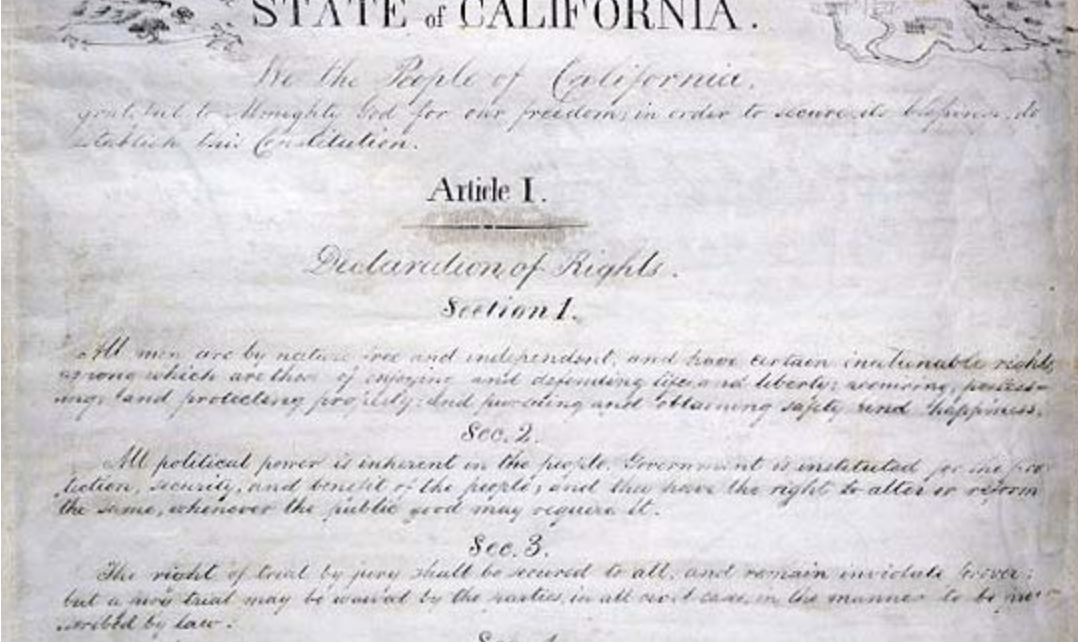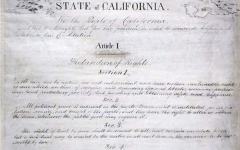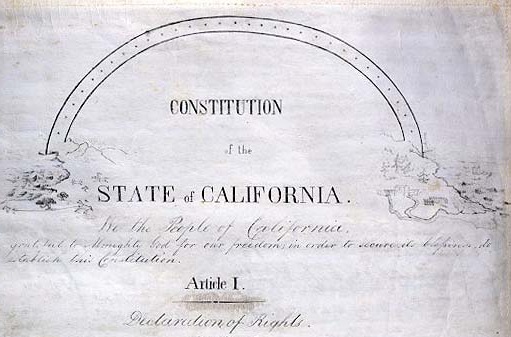
California Constitution. (Photo: www.sos.ca.gov)
Frequently Asked Questions about the California Constitution Article XI
What laws are allowed by local governments?
By Chris Micheli, May 17, 2024 2:30 am
How many sections does Article 11 have? This article contains fifteen sections.
What does Article 11 relate to? It relates to local government.
How does California provide for county governments? Section 1 provides that the State is divided into counties which are legal subdivisions of the State. The Legislature prescribes uniform procedure for county formation, consolidation, and boundary change. It also provides for county powers, an elected county sheriff, an elected district attorney, an elected assessor, and an elected governing body in each county.
How does California provide for city governments? Section 2 requires that the Legislature prescribe uniform procedures for city formation and provide for city powers.
Are city charters allowed for local governments? Section 3 provides that, for its own government, a county or city may adopt a charter by majority vote of its electors voting on the question. The charter is effective when filed with the Secretary of State. A charter may be amended, revised, or repealed in the same manner.
Are county charters allowed for local governments? Section 4 specifies that county charters provide for: (a) A governing body of 5 or more members, elected by district or, at large, or with a requirement that they reside in a district. (b) The compensation, terms, and removal of members of the governing body. (c) An elected sheriff, an elected district attorney, an elected assessor, other officers, their election or appointment, compensation, terms and removal. (d) The performance of functions required by statute. (e) The powers and duties of governing bodies and all other county officers, and for consolidation and segregation of county officers, and for the manner of filling all vacancies occurring therein. (f) The fixing and regulation by governing bodies by ordinance and for the prescribing and regulating by such bodies of the powers, duties, qualifications, and compensation of such persons, the times at which, and terms for which they shall be appointed, and the manner of their appointment and removal.
What is addressed in a city charter? Section 5 states that any city charter may make and enforce all ordinances and regulations in respect to municipal affairs, subject only to restrictions and limitations provided in their several charters and in respect to other matters they are subject to as general laws.
How does a consolidation occur? Section 6 provides that a county and all cities within it may consolidate as a charter city and county as provided by statute.
What laws are allowed by local governments? Section 7 specifies that a county or city may make and enforce within its limits all local, police, sanitary, and other ordinances and regulations not in conflict with general laws.
What can local ballot measures not do? Section 7.5 prohibits a city or county measure proposed by the legislative body of a city, charter city, county, or charter county and submitted to the voters for approval from doing specified items.
Can counties provide city functions? Section 8 states that the Legislature may provide that counties perform municipal functions at the request of cities within them. Also, if provided by their respective charters, a county may agree with a city within it to assume and discharge specified municipal functions for that city.
What are municipal corporations allowed to do? Section 9 provides that a municipal corporation may establish, purchase, and operate public works to furnish its inhabitants with light, water, power, heat, transportation, or means of communication.
Is additional compensation allowed to local government workers? Section 10 specifies that a local government body may not grant extra compensation or extra allowance to a public officer, public employee, or contractor after service has been rendered or a contract has been entered into and performed in whole or in part, or pay a claim under an agreement made without authority of law.
What authority cannot be delegated? Section 11 provides that the Legislature may not delegate to a private person or body power to make, control, appropriate, supervise, or interfere with county or municipal corporation improvements, money, or property, or to levy taxes or assessments, or perform municipal functions.
How are claims against local governments handled? Section 12 specifies that the Legislature may prescribe procedures for the presentation, consideration, and enforcement of claims against counties, cities, their officers, agents, or employees.
What are the boundaries of later formed local governments? Section 14 states that a local government formed after the effective date of this section, the boundaries of which include all or part of two or more counties, cannot levy a property tax, unless that tax has been approved by a majority vote of the qualified voters of that local government voting on the issue of the tax.
How are vehicle license fee revenues allocated? Section 15 specifies the allocation of revenues derived from taxes imposed pursuant to the Vehicle License Fee Law that does not exceed 0.65 percent of the market value of the vehicle.
- Regulatory Powers of the Fish and Game Commission - March 2, 2026
- Committee Versus Floor Lobbying - March 1, 2026
- Fishing Traps in California - March 1, 2026



